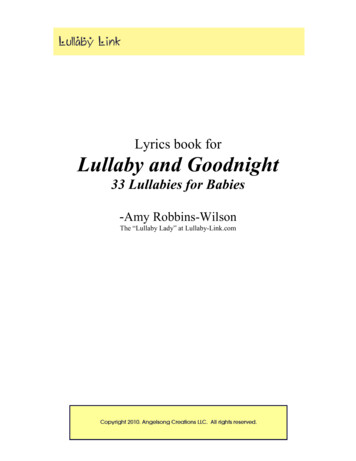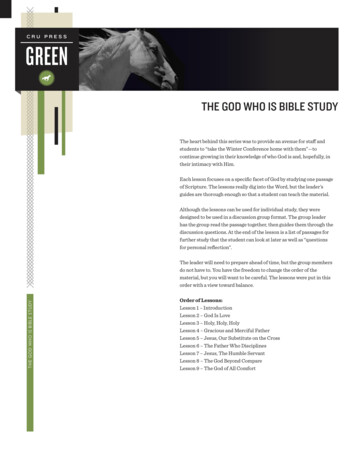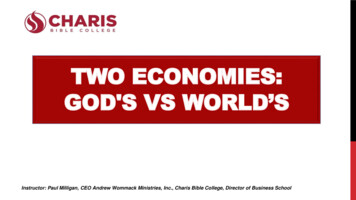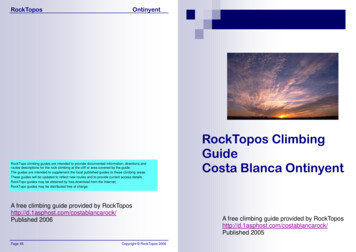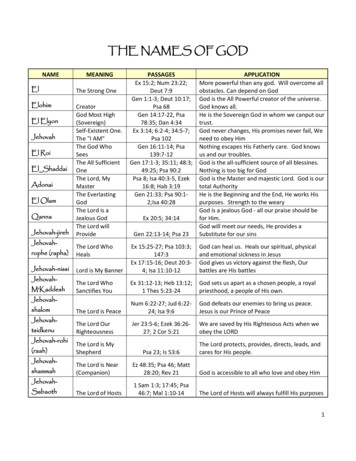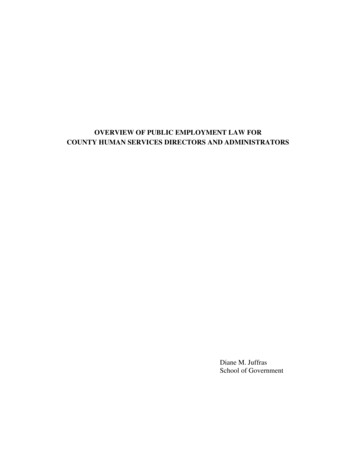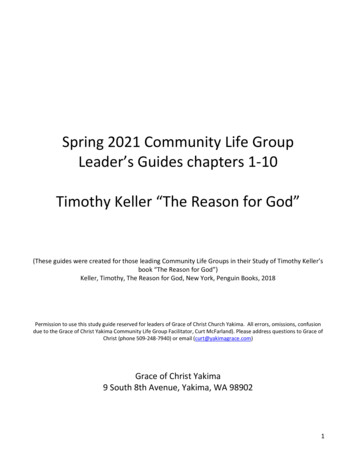
Transcription
Spring 2021 Community Life GroupLeader’s Guides chapters 1-10Timothy Keller “The Reason for God”(These guides were created for those leading Community Life Groups in their Study of Timothy Keller’sbook “The Reason for God”)Keller, Timothy, The Reason for God, New York, Penguin Books, 2018Permission to use this study guide reserved for leaders of Grace of Christ Church Yakima. All errors, omissions, confusiondue to the Grace of Christ Yakima Community Life Group Facilitator, Curt McFarland). Please address questions to Grace ofChrist (phone 509-248-7940) or email (curt@yakimagrace.com)Grace of Christ Yakima9 South 8th Avenue, Yakima, WA 989021
Spring 2021 Community Life GroupLeader GuideTimothy Keller’s “The Reason for God”Week One: Chapter One2
Grace Community Life Group Leader GuideThe Reason for God: Belief in an Age of Skepticism, Timothy KellerWeek 1: Preface, Introduction, and Chapter 1 “There Can’t Be Just One True Religion” (pages xi-21)Purpose of Community Groups The goal is not to get through the material the goal is to get to know each other, and foreveryone to gain a better understanding of who Jesus is, and what that means for their life.To build safe environment where group members feel safe to share honestly. Considerdiscussing and agreeing to a set of group guidelines.o Confidentiality. What is shared in the group stays in the group. You are free to sharewhat you have said in the group, but not what others have said.o Listen when others are sharing. Do not interrupt or attempt to fix the other person.Listen.o Do not dominate the group discussion. Let others speak. Encourage others to speak.Be willing to adjust your approach to the group if the group leader indicates others needto be heard from.Support and care. Community Life Groups are the best way to care for others, and to be caredfor by others. Share your needs, and respond to the needs expressed by others.Please use only what you find helpful in this guide.Get to Know you questions (The first week or two you may spend a majority of your time gettingto know each other).1. Share two things about yourself not many people know.2. Describe the most extravagant meal you’ve ever eaten. Where were you? When was this?What was prepared and what did you eat? How did it make you feel?3. What has been the most helpful book you’ve ever read regarding faith and spiritual life (Thisdoes not have to be a Christian book)? What did it help you understand about God, aboutspiritual life?4. Someone you know asks you which book in the Bible they should read to understand Christianfaith? What book would you recommend to them? Why?5. What are the most common problems people have with Christian faith?Overview of the book (This ten-week study will focus on the first 10 chapters)Introduction1. There Can’t be Just One Religion2. How Could a Good God Allow Suffering3. Christianity is a Straightjacket4. The Church is Responsible for so Much Injustice5. How Can a Loving Gods Send People to Hell6. Science has Disproved Christianity8. The Clues of God9. The Knowledge of God10. The Problem of Sin11. Religion and the Gospel12. The (True) Story of the Cross13. The Reality of the Resurrection14. The Dance of God3
7. You Can’t Take the Bible LiterallyEpilogue: Where do We Go from Here?Chapter 1 Opening Quotes“How can there be just one true faith?” asked Blair, a twenty-four-year-old woman living inManhattan. “It’s arrogant to say your religion is superior and try to convert everyone else to it.Surely all the religions are equally good and valid for meeting the needs of their particularfollowers.”“Religious exclusivity is not just narrow – it’s dangerous,” added Geoff, a twentysomething Britishman also living in New York City. “Religion has led to untold strife, division, and conflict. It may bethe greatest enemy of peace in the world. If Christians continue to insist that they have ‘the truth’– and if other religions do this as well – the world will never know peace.”1Preface and Introduction Questions What are some of the reasons the “none” group is growing more rapidly than other “religious”group?Do you agree that the world is getting both “more religious” and “less religious” at the sametime?What type of Christian faith were you exposed to growing up? Positives? Negatives?Do Social Justice types tend toward Moral Relativism (the belief that everyone decides forthemselves what is right and wrong)?Do Moral Majority types tend to have less concern for the poor?If you are a Christian, why are you a Christian? If you are still exploring Christian faith what is itthat is most troubling about the Christian message, what keeps you in the “exploring” stage?What is the strongest argument AGAINST Christian faith?Of the three stories included at the end of the introduction, which most resonates with you?“People who blithely go through life too busy, or too indifferent, to ask hard questions about whythey believe as they do will find themselves defensive against either the experience of tragedy orthe probing question of a smart skeptic.” Timothy KellerChapter 1 Questions Do you agree with the author that one of the most difficult aspects of Christian faith for many isthe Christian claim of exclusivity?How do you respond to the quote on page 4, “If Christians are right about Jesus being God,then Muslims and Jews fail in a serious way to love God as God really is, but if Muslims andJews are right that Jesus is not God but a teacher or prophet, then Christians fail in a seriousway to love God as God really is.”How can a religious group’s claim to exclusive truth lead to isolation form others, stereotypingothers, and even violence against others outside the group? Is that where Christian faith’sclaim to exclusivity lead those who follow Jesus?1The quotes at the beginning of each chapter are taken from an e-mail survey of young New Yorkers in their mid-twentieswho were asked to articulate their main doubts and objections to Christianity. The names have been changed.4
How have you seen the three approaches to “contain” the excesses of religious groups (pages5-18) lived out around you and in the larger world? 1) Outlaw religion, 2) Condemn religion, 3)Keep religion completely private.How do you respond to the quote (Stephen Carter of Yale) on page 15 “Efforts to craft a publicsquare from which religious conversation is absent, no matter how thoughtfully worked out,will always in the end say to those of organized religion that they alone, unlike everybody else,must enter public dialogue only after leaving behind that part of themselves that they considermost vital.”o Is it possible for any of us to dismiss what is most important to us when we enter intopublic conversations and decisions?o Everyone has a worldview they bring with them as they make decisions about politics,relationships, ethics, priorities. Do you agree with this? Discuss.o Has the author made a reasonable case for the statement he includes at the bottom ofpage 17 and top of 18, “Secular grounds for moral positions are no less controversialthan religious grounds, and a very strong case can be made that all moral positions areat least implicitly religious. Ironically, insisting that religious reasoning be excluded fromthe public square is itself a controversial “sectarian” point of view.”Do you agree with the claim (page 19) “Christianity provides a firm basis for respecting peopleof other faiths.”o What examples do you have that violate this understanding? People who claim to beChristians but show little or no respect for those who believe differently.o What examples do you have that support this understanding? People who claim to beChristians who show great respect for those who believe differently?§ Which of the two above represent most accurately what Jesus models andcommands? Can you think of scripture verses and stories that reinforce yourunderstanding of how Christians are to relate to those with different beliefs?Quote on page 20, “Christians, then, should expect to find nonbelievers who are much nicer,kinder, wiser, and better than they are. Why is this?Read the second to last paragraph on page 21, beginning, “Why would such an exclusive beliefsystem lead to behavior that was so open to others?” Do you agree with the author’sconclusions? Discuss.Additional Resources for LeadersScripture for Consideration Acts 17:16-34 Paul’s response to other faiths. “Now while Paul was waiting for them at Athens,his spirit was provoked within him as he saw that the city was full of idols.” 1 Peter 3:15-16 Peter’s instructions on respect. “but in your hearts honor Christ the Lord asholy, always being prepared to make a defense to anyone who asks you for a reason for thehope that is in you; yet do it with gentleness and respect, 16 having a good conscience, sothat, when you are slandered, those who revile your good behavior in Christ may be put toshame.” John 14:6 “Jesus said to him, “I am the way, and the truth, and the life. No one comes to theFather except through me.”5
Acts 4:11-12 “This Jesus is the stone that was rejected by you, the builders, which has becomethe cornerstone. 12 And there is salvation in no one else, for there is no other name underheaven given among men by which we must be saved.”Romans 10:9-13 “if you confess with your mouth that Jesus is Lord and believe in your heartthat God raised him from the dead, you will be saved. 10 For with the heart one believes and isjustified, and with the mouth one confesses and is saved. 11 For the Scripture says, “Everyonewho believes in him will not be put to shame.” 12 For there is no distinction between Jew andGreek; for the same Lord is Lord of all, bestowing his riches on all who call on him. 13 For“everyone who calls on the name of the Lord will be saved.”Mark 10:42-45 “And Jesus called them to him and said to them, “You know that those who areconsidered rulers of the Gentiles lord it over them, and their great ones exercise authority overthem. 43 But it shall not be so among you. But whoever would be great among you must be yourservant, 44 and whoever would be first among you must be slave of all. 45 For even the Son ofMan came not to be served but to serve, and to give his life as a ransom for many.”1 John 2:23 “No one who denies the Son has the Father. Whoever confesses the Son has theFather also”John 8:58 “Jesus said to them, “Truly, truly, I say to you, before Abraham was, I am.”John 10:27-30 “My sheep hear my voice, and I know them, and they follow me. 28 I give themeternal life, and they will never perish, and no one will snatch them out of my hand. 29 MyFather, who has given them to me, is greater than all, and no one is able to snatch them out ofthe Father's hand. 30 I and the Father are one.”Acts 16:29-31 “And the jailer called for lights and rushed in, and trembling with fear he felldown before Paul and Silas. 30 Then he brought them out and said, ‘Sirs, what must I do to besaved?’ 31 And they said, ‘Believe in the Lord Jesus, and you will be saved, you and yourhousehold.’”1 Timothy 2:5-6 “For there is one God, and there is one mediator between God and men, theman Christ Jesus, 6 who gave himself as a ransom for all, which is the testimony given at theproper time.”C.S. Lewis on other faithsFrom “Mere Christianity” “If you are a Christian you do not have to believe that all the other religions are simply wrong allthrough. If you are an atheist you do have to believe that the main point in all the religions ofthe whole world is simply one huge mistake. If you are a Christian, you are free to think that allthese religions, even the queerest ones, contain at least some hint of the truth. When I was anatheist I had to try to persuade myself that most of the human race have always been wrongabout the question that mattered to them most; when I became a Christian I was able to take amore liberal view. But, of course, being a Christian does mean thinking that where Christianitydiffers from other religions, Christianity is right and they are wrong. As in arithmetic—there isonly one right answer to a sum, and all other answers are wrong: but some of the wronganswers are much nearer being right than others.”6
From “the Great Divorce” We are not living in a world where all roads are radii of a circle and where all, if followed longenough, will therefore draw gradually nearer and finally meet at the centre: rather in a worldwhere every road, after a few miles, forks into two, and each of those into two again, and ateach fork you must make a decision. Even on the biological level life is not like a river but like atree. It does not move towards unity but away from it and the creatures grow further apart asthey increase in perfection. Good, as it ripens, becomes continually more different not onlyfrom evil but from other good.”If you have any questions or comments, if you need help with this study, with members of your group,or with technology, please call (248-7940 x114) or email (curt@yakimagrace.com)7
Spring 2021 Community Life GroupLeader GuideTimothy Keller’s “The Reason for God”Week Two: Chapter Two8
Grace Community Life Group Leader GuideThe Reason for God: Belief in an Age of Skepticism, Timothy KellerWeek 2: Chapter 2 “How Could a Good God Allow Suffering” (pages 22-34)Purpose of Community Groups The goal is not to get through the material the goal is to get to know each other, and foreveryone to gain a better understanding of who Jesus is, and what that means for their life.To build safe environment where group members feel safe to share honestly. Considerdiscussing and agreeing to a set of group guidelines.o Confidentiality. What is shared in the group stays in the group. You are free to sharewhat you have said in the group, but not what others have said.o Listen when others are sharing. Do not interrupt or attempt to fix the other person.Listen.o Do not dominate the group discussion. Let others speak. Encourage others to speak.Be willing to adjust your approach to the group if the group leader indicates others needto be heard from.Support and care. Community Life Groups are the best way to care for others, and to be caredfor by others. Share your needs, and respond to the needs expressed by others.Please use only what you find helpful in this guide.Get to Know you questions (The first week or two you may spend a majority of your time gettingto know each other).6. Where is one place you have traveled to, visited, that you would return to tomorrow if you hadthe chance? Why is that place such a draw for you?7. Where were you when you heard about the Earthquake in Haiti (January 2010)? How didwatching the news coverage make you feel? How did you respond personally? How did youresolve what happened there with your belief in God (or if you do not believe in God, how didyou make sense of what happened)?8. Share about your first experience in church (or if you were raised in the church, your first clearmemory). Was your experience in church positive or negative? Discuss your answer.Overview of the book (This ten-week study will focus on the first 10 chapters)Introduction1. There Can’t be Just One Religion2. How Could a Good God Allow Suffering3. Christianity is a Straightjacket4. The Church is Responsible for so Much Injustice5. How Can a Loving Gods Send People to Hell6. Science has Disproved Christianity7. You Can’t Take the Bible Literally8. The Clues of God9. The Knowledge of God10. The Problem of Sin11. Religion and the Gospel12. The (True) Story of the Cross13. The Reality of the Resurrection14. The Dance of GodEpilogue: Where do We Go from Here?9
Chapter 2 Opening QuotesChapter 2: How Could a Good God Allow Suffering?1. “God allows terrible suffering in the world. So he might be either all-powerful but not goodenough to end evil and suffering, or else he might be all-good but not powerful enough to endevil and suffering. Either way the all-good, all-powerful God of the Bible couldn’t exist.” Hillary,an undergrad English major“This isn’t a philosophical issue to me,“ added Rob, Hillary’s boyfriend. “This is personal. I won’tbelieve in a God who allows suffering, even if he, she, or it exists. Maybe God exists. Maybe not.But if he does, he can’t be trusted.”2Chapter 2 Questions1.2.3.4.5.6.7.8.Is there evil and suffering in this world? Provide examples.Why is the presence of evil and suffering an excuse for some not to believe in God?Is this chapter’s title the BIGGEST problem people have with the God of Christian faith?What’s your response when someone brings up evil & suffering as a reason they do not believein God?Does Christian faith create the “problem of evil” because it claims that God is: 1) “All-Powerful”,2) He is “All Good” and loves us, and 3) that there is evil in this world?a. How does Islam, and it’s understanding of Kismet (Fate), address this problem?3b. How does Hinduism and Buddhism, with their belief in reincarnation and Karma,address this problem?4c. How does atheism make sense of evil and suffering?Do you agree with Philosopher Mackie (page 23) “if a good and powerful God exists, he wouldnot allow pointless evil”?How does the Biblical story of Joseph (sold by his brothers into slavery, accused of a crime hedidn’t commit, years in prison, separated from his family ) speak to the Christian response toevil and suffering? (story in Genesis. Read Genesis 37:12-28, 39:1-41:57, 50:15-21)Keller asks, Could there be a reason God allows evil and suffering to exist?a. Is the story of the man who lost his sight (page 25) a satisfactory answer to evil andsuffering?b. What possible positive purpose could evil and suffering serve?2The quotes at the beginning of each chapter are taken from an e-mail survey of young New Yorkers in their mid-twentieswho were asked to articulate their main doubts and objections to Christianity. The names have been changed.3Islamic faith: God also created us for a test, and part of this test is to experience trials with suffering and evil. Passing thetest facilitates our permanent abode of eternal bliss in paradise. The Qur’an explains that God created death and life, "sothat He may put you to test, to find out which of you is best in deeds: He is the The-Almighty, The-Forgiving." (Qur’an67:2)4Hinduism and Buddhism believe in Karma. Karma If you are experiencing trouble and misfortune you are only receivingin this life the just rewards or punishments for your intentional actions in your previous life. The universe is just. Everyintentional misdeed is balanced out.10
9. Keller quotes C.S. Lewis for a reason suffering may actually PROVE the existence of God. “My argument against God was that the universe seemed so cruel and unjust. but how hadI got the idea of "just" and "unjust”? ”What was I comparing the universe with when Icalled it unjust? Of course I could have given up my idea of justice by saying it wasnothing but a private idea of my own. But if I did that, then my argument against Godcollapsed too – for the argument depended on saying that the world was really unjust, notsimply that it didn’t happen to please my private fancies consequently atheism turns outto be too simple.” Does Lewis have a point? Is our belief in justice, evil, suffering actually a proof for God? Is there a real “good and bad” or do we call evil “bad” because we just don’t happen to likeit?“Though the Christian faith does not provide the reason for each experience of pain, it provides deepresources for actually facing suffering with hope and courage rather than bitterness and despair.”Peter Kreeft (page 26)“The death of Jesus is qualitatively different from any other death.” Page 30.10. How does the cross, Jesus offering up His life, change how we understand suffering?a. God doesn’t like evil and sufferingb. God joins us in the evil and suffering we facec. God overcomes evil and suffering and God promises He will put to right all wrongs, allsufferings, all evil.“They say of some temporal suffering, ‘No future bliss can make up for it,’ not knowing that heaven,once attained, will work backwards and turn even that agony into a glory”. C.S. Lewis (page 34)11. How do you respond to the author’s conclusion to this chapter (pages 33-34)? Has this chapterbeen helpful? How will you respond when someone comes to you and raises this objection toChristian faith?Additional Resources for Leaders A Grace Disguised, Jerry Sittser (The story of the sudden loss of his wife, mother-in-law and daughter)A Grief Observed, C.S. Lewis (His journal recording his thoughts, doubts, struggles on the death of his wife)The Problem of Pain, C.S. Lewis (A theoretical/theological treatment of pain and suffering)If you have any questions or comments, if you need help with this study, with members of your group,or with technology, please call (248-7940 x114) or email (curt@yakimagrace.com)1-20-21 CM11
Spring 2021 Community Life GroupLeader GuideTimothy Keller’s “The Reason for God”Week Three: Chapter Three12
Grace Community Life Group Leader GuideThe Reason for God: Belief in an Age of Skepticism, Timothy KellerWeek 3: Chapter 3 “Christianity is a Straitjacket” (pages 35-51)Purpose of Community Groups The goal is not to get through the material the goal is to get to know each other, and foreveryone to gain a better understanding of who Jesus is, and what that means for their life.To build safe environment where group members feel safe to share honestly. Considerdiscussing and agreeing to a set of group guidelines.o Confidentiality. What is shared in the group stays in the group. You are free to sharewhat you have said in the group, but not what others have said.o Listen when others are sharing. Do not interrupt or attempt to fix the other person.Listen.o Do not dominate the group discussion. Let others speak. Encourage others to speak.Be willing to adjust your approach to the group if the group leader indicates others needto be heard from.Support and care. Community Life Groups are the best way to care for others, and to be caredfor by others. Share your needs, and respond to the needs expressed by others.Please use only what you find helpful in this guide.Get to Know you questions9. What is the highest point (elevation-wise) you’ve ever been (not counting trips in airplanes)?Where were you? When were you there? What did it take for you to get there? What did yousee and how did it make you feel?10. Describe your first car? How did you get the car? What are two memories about the car?What happened to that car?11. When you hear the word “freedom” how do it make you feel? Have you ever been somewherewhere there were significant restrictions on personal freedom? Explain. When was a time youfelt most “free”? Where were you? What made you feel “free”?Overview of the book (This ten-week study will focus on the first 10 chapters)Introduction1. There Can’t be Just One Religion2. How Could a Good God Allow Suffering3. Christianity is a Straightjacket4. The Church is Responsible for so Much Injustice5. How Can a Loving Gods Send People to Hell6. Science has Disproved Christianity7. You Can’t Take the Bible Literally8. The Clues of God9. The Knowledge of God10. The Problem of Sin11. Religion and the Gospel12. The (True) Story of the Cross13. The Reality of the Resurrection14. The Dance of GodEpilogue: Where do We Go from Here?13
Chapter 3 Opening Quotes Christianity is a Straightjacket1. Christians believe that they have the absolute truth that everyone else has to believe – or else that attitude endangers everyone’s freedom.” Keith, a young artist living in Brooklyn2. “Yes,” said Chloe, another young artist. “A ‘One-Truth-Fits All’ approach is just too confining.The Christians I know don’t seem to have the freedom to think for themselves. I believe eachindividual must determine truth for him – or herself.”5Chapter 3 Questions12. Does Christianity claim there is an absolute TRUTH to which ALL are ultimately accountable?a. If yes, what are those TRUTH claims? Consider: Acts 17:16-34 Read Paul’s response when faced with all of the other faiths affirmedin Athens. “Now while Paul was waiting for them at Athens, his spirit was provokedwithin him as he saw that the city was full of idols.” Deuteronomy 6:4-6 “Hear, O Israel: The Lord our God, the Lord is one. 5 You shalllove the Lord your God with all your heart and with all your soul and with all yourmight. 6 And these words that I command you today shall be on your heart” Isaiah 45:21 “Declare and present your case; let them take counsel together! Whotold this long ago? Who declared it of old? Was it not I, the Lord? And there is noother god besides me, a righteous God and a Savior; there is none besides me. John 14:6 “Jesus said to him, “I am the way, and the truth, and the life. No onecomes to the Father except through me.” Acts 4:11-12 “This Jesus is the stone that was rejected by you, the builders, whichhas become the cornerstone. 12 And there is salvation in no one else, for there is noother name under heaven given among men by which we must be saved.” Romans 10:9-13 “if you confess with your mouth that Jesus is Lord and believe inyour heart that God raised him from the dead, you will be saved. 10 For with theheart one believes and is justified, and with the mouth one confesses and is saved. 11For the Scripture says, “Everyone who believes in him will not be put to shame.” 12For there is no distinction between Jew and Greek; for the same Lord is Lord of all,bestowing his riches on all who call on him. 13 For “everyone who calls on the nameof the Lord will be saved.” 1 John 2:23 “No one who denies the Son has the Father. Whoever confesses the Sonhas the Father also” John 8:58 “Jesus said to them, “Truly, truly, I say to you, before Abraham was, I am.” Acts 16:29-31 “And the jailer called for lights and rushed in, and trembling with fearhe fell down before Paul and Silas. 30 Then he brought them out and said, ‘Sirs, whatmust I do to be saved?’ 31 And they said, ‘Believe in the Lord Jesus, and you will besaved, you and your household.’”5The quotes at the beginning of each chapter are taken from an e-mail survey of young New Yorkers in their mid-twentieswho were asked to articulate their main doubts and objections to Christianity. The names have been changed.14
1 Timothy 2:5-6 “For there is one God, and there is one mediator between God andmen, the man Christ Jesus, 6 who gave himself as a ransom for all, which is thetestimony given at the proper time.b. If no, how would you define the main beliefs of Christian faith?13. What do we make of other faiths that claim they have the absolute TRUTH? Can all religiousclaims of all faith groups be TRUE? What do we do when two faith groups hold diametrically opposite beliefs about God?14. Do you agree with Foucault that “all truth claims are power plays”? (page 37). What is the maindifficulty with Foucault’s statement?15. What is meant by, “The new rebel is a skeptic by rebelling against everything he has lost hisright to rebel against anything” G.K Chesterton (1874 – 1936) (page 38)16. How do you respond to the author’s claim (on page 39) that “The idea of a totally inclusivecommunity is, therefore, an illusion. Every human community holds in common some beliefsthat necessarily create boundaries, including some people and excluding others from its circle”? Is it possible to belong to a group without agreeing to that group’s understandings onparticular core beliefs: what is true or not true, behavior that is acceptable or notacceptable, held by that group? If yes, please provide examples.17. Does claiming there is no absolute TRUTH also become an absolute TRUTH claim?o Is the claim that all paths/faiths ultimately lead to the same God an absolute TRUTH claim?o Is the philosophical/religious claim that, “everyone decides for themselves what is true” theanswer? What are the problems with this belief?18. Do you agree with the author that Christianity has not insisted other cultures adapt to westernconcepts (honesty requires we acknowledge there have been clear violations of this in thehistory of Christian missions but those are not the error of Christian faith, rather the error ofthose evangelizing) instead Christianity “has taken more culturally diverse forms than otherfaiths”? (page 46)619. How would you define the concept of “freedom”? What does freedom look like in a person’sday to day life?6See note 25 for this chapter in the back of the “Reason for God” book.15
20. Does Christianity deprive a person of their freedom? Discuss how it might, or might not, limitindividual freedom. Is a person free only if they are able to do and believe whatever they want, wheneverthey want, however they want?o What happens when the freedom of person A crashes into the freedom ofperson B? Does a stop sign, a speed limit, the requirement for a driver’s license,take away a person’s individual freedom?o What would a family, or a society, look like if everyone who was a part of thatfamily/society decided for themselves how they wanted to live?21. Discuss the author’s comment (page 47) “In many areas of life, freedom is not so much theabsence of restrictions as finding the right ones, the liberating restrictions.”a. What of Keller’s claim about love and freedom? (pages 47 – 48). And, “for a loverelationship to be healthy there must be a mutual loss of independence.” (page 50)22. How does being a Christian lead you to treat those who hold other beliefs, those who are a partof other faiths, those who disagree with you? (See 1 Peter 3:15, “Gentleness and respect ”)Additional Resources for LeadersQuotes by C.S. Lewis (1898 – 1963) “One of the greatest difficulties is to keep before the audience’s mind the question of Truth.They always think you are recommending Christianity not because it is true, but because it isgood. And in the discussion they will at every moment try to escape from the issue ‘True-orFalse’
Timothy Keller “The Reason for God” (These guides were created for those leading Community Life Groups in their Study of Timothy Keller’s book “The Reason for God”) Keller, Timothy, The Reason for God, New York, Penguin Books, 2018 Permission to use this study gui



